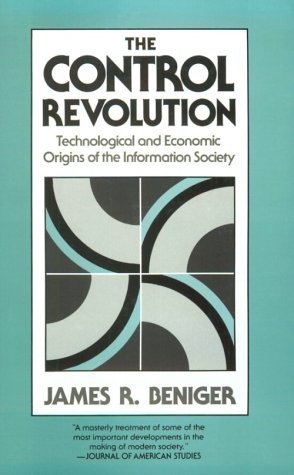James R. Beniger: The Control Revolution: Technological and Economic Origins of the Information Society (1986)
Filed under book | Tags: · advertising, agriculture, bureaucracy, computing, cybernetics, economy, energy, history of technology, industrial revolution, industry, information society, management, mass media, radio, society, technology, telegraphy, telephone, television, transport

“James Beniger traces the origin of the Information Society to major economic and business crises of the past century. In the United States, applications of steam power in the early 1800s brought a dramatic rise in the speed, volume, and complexity of industrial processes, making them difficult to control. Scores of problems arose: fatal train wrecks, misplacement of freight cars for months at a time, loss of shipments, inability to maintain high rates of inventory turnover. Inevitably the Industrial Revolution, with its ballooning use of energy to drive material processes, required a corresponding growth in the exploitation of information: the Control Revolution.
Between the 1840s and the 1920s came most of the important information-processing and communication technologies still in use today: telegraphy, modern bureaucracy, rotary power printing, the postage stamp, paper money, typewriter, telephone, punch-card processing, motion pictures, radio, and television. Beniger shows that more recent developments in microprocessors, computers, and telecommunications are only a smooth continuation of this Control Revolution. Along the way he touches on many fascinating topics: why breakfast was invented, how trademarks came to be worth more than the companies that own them, why some employees wear uniforms, and whether time zones will always be necessary.”
Publisher Harvard University Press, 1986
ISBN 0674020766, 9780674020764
493 pages
via babyalanturing
Review (JoAnne Yates, The Journal of Interdisciplinary History, 1988)
Review (Krishan Kumar, Journal of American Studies, 1988)
Review (Kirkus Reviews)
Book-inspired website
Publisher
PDF (16 MB, updated on 2016-6-16)
Comment (0)Christian Engström MEP, Rick Falkvinge: The Case for Copyright Reform (2012)
Filed under book | Tags: · acta, copyright, drm, eu, filesharing, free speech, information society, piracy, pirate party, politics, sampling

Legalized file sharing, shorter protection times for the commercial copyright monopoly, free sampling and a ban on DRM.
These are the main points of the proposal for copyright reform that the Pirate Party is advocating and which the Greens/EFA group in the European Parliament adopted as its group position in September 2011.
This is a constructive alternative to the controversial ACTA agreement and to the criminalization of the entire generation of youths. This booklet explains why such a reform is both necessary and sustainable and will benefit both citizens and artists.
Published by Pirate MEP Christian Engström with support from the Greens/EFA-group in the European Parliament, 17 April 2012
Creative Commons CC0 license
ISBN 9781471671784
108 pages
commentary (Ernesto, TorrentFreak.com)
discussion (Slashdot.org)
authors
authors (facebook)
author
author
PDF (PDF)
PDF (ODT)
PDF (RTF)
PDF (DOC)
PDF (MOBI)
PDF (EPUB)
View online (Issuu.com)
Cass R. Sunstein: Infotopia: How Many Minds Produce Knowledge (2006)
Filed under book | Tags: · floss, information, information society, internet, knowledge, knowledge production, open source, prediction market, wikipedia

The rise of the “information society” offers not only considerable peril but also great promise. Beset from all sides by a never-ending barrage of media, how can we ensure that the most accurate information emerges and is heeded? In this book, Cass R. Sunstein develops a deeply optimistic understanding of the human potential to pool information, and to use that knowledge to improve our lives.
In an age of information overload, it is easy to fall back on our own prejudices and insulate ourselves with comforting opinions that reaffirm our core beliefs. Crowds quickly become mobs. The justification for the Iraq war, the collapse of Enron, the explosion of the space shuttle Columbia–all of these resulted from decisions made by leaders and groups trapped in “information cocoons,” shielded from information at odds with their preconceptions. How can leaders and ordinary people challenge insular decision making and gain access to the sum of human knowledge?
Stunning new ways to share and aggregate information, many Internet-based, are helping companies, schools, governments, and individuals not only to acquire, but also to create, ever-growing bodies of accurate knowledge. Through a ceaseless flurry of self-correcting exchanges, wikis, covering everything from politics and business plans to sports and science fiction subcultures, amass–and refine–information. Open-source software enables large numbers of people to participate in technological development. Prediction markets aggregate information in a way that allows companies, ranging from computer manufacturers to Hollywood studios, to make better decisions about product launches and office openings. Sunstein shows how people can assimilate aggregated information without succumbing to the dangers of the herd mentality–and when and why the new aggregation techniques are so astoundingly accurate.
In a world where opinion and anecdote increasingly compete on equal footing with hard evidence, the on-line effort of many minds coming together might well provide the best path to infotopia.
Publisher Oxford University Press, 2006
ISBN 0195189280, 9780195189285
273 pages

